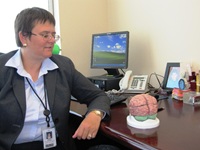What happens when dementia and delusions combine
Administrator | Jul 22, 2013 | Comments 0
Roughly half of people with Alzheimer’s disease experience delusions at some point in their illness. Yet caregivers and health professionals don’t always realize the range of additional challenges this entails.
Researchers have long known that those with Alzheimer’s disease who are delusional can be more agitated and aggressive. This often leads to higher stress levels among caregivers. Recent research also shows Alzheimer’s disease progresses much faster when people experience delusions.
But until geriatric psychiatrist Corinne Fischer and her team investigated, it wasn’t clear if Alzheimer’s disease and delusions combined to make it harder to perform daily tasks most of us take for granted.
She felt that if caregivers knew the answer to this question, they could make more informed choices.
“And if you are a doctor and see delusions in your patient, you may want to treat them earlier and get them more support,” says Fischer, director of geriatric psychiatry at Toronto’s St. Michael’s Hospital.
While delusions associated with other illnesses are wide-ranging, people with Alzheimer’s disease experience only two types:.
Persecutory delusions, which means if they lose their glasses or keys, they assume someone stole them.
Mis-identification delusions, which causes them to confuse the identities of those close to them. Someone they believe is their brother is a son or a friend.
Bathing, grocery shopping and making telephone calls
To figure out if these delusions correlated with increased difficulties with daily tasks, Fischer and her team compared 38 people with Alzheimer’s disease, half with delusions and half without. Funded by the Alzheimer Society Research Program, they gave caregivers detailed questionnaires to discover how well their family members completed the steps involved in daily tasks. That included tasks such as bathing, grocery shopping, taking their medications, making telephone calls and keeping medical appointments.
Fischer found the group with both Alzheimer’s and delusions performed significantly worse.
This was despite the fact both groups had the same level of cognitive impairment, measured in terms of their ability to remember and learn new things.
Still, the results were not unexpected. The brains of people with both Alzheimer’s disease and delusions show more damage to the frontal lobe region compared to those with just Alzheimer’s. This region of the brain is responsible for executive functions such as planning.
“We now know that those with delusions are going to be more vulnerable,” says Fischer. “This is important for doctors and family members to know.”
– Story by the Alzheimer Society of Ontario http://www.alzheimer.ca/en/on
For more on services, programs and supports in Prince Edward County, call 476-2085 or visit http://www.alzpec.ca/Prince_Edward_County_-114923.html
Filed Under: News from Everywhere Else
About the Author:


































